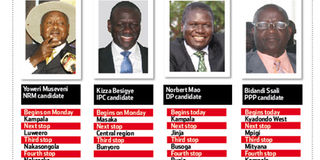Army, youth MPs’ future uncertain

Speaker Edward Ssekandi yesterday said there will be no nomination for the army, the youth, the women and other interest groups represented in Parliament until legislators evaluate the relevance of their continued stay in the House.
Mr Ssekandi told Parliament that it will be illegal for the MPs representing the army, women, workers, youth and people with disabilities (PWDs) to contest in the next general elections without parliamentary approval as required by the Constitution.
Women MPs affected
“All the interest groups in Parliament cannot be nominated until we have reviewed their status,” Mr Ssekandi said. “Article 78 of the 1995 Constitution is clear on this matter. The law gives Parliament the mandate to review the representation of interest groups. It’s up to us to retain, increase or abolish some of these groups from being represented in the next Parliament.”
The Electoral Commission has set the nomination dates for candidates for MP less than a month away on November 25 - 26. However, the latest revelation puts the political future of the interest groups represented in Parliament in jeopardy and potentially offers the opposition an opportunity to argue for their long-stated desire to eject the army, presently represented by 10 members, out of Parliament.
Avoiding crisis
“We don’t want to cause a crisis, whoever is responsible should bring a motion so that we can allow the Electoral Commission to prepare for elections for these interest groups in Parliament,” Mr Ssekandi said.
While the ruling NRM party might use its numerical advantage to retain the army in Parliament, the Inter-Party Co-operation (IPC), a coalition of the opposition parties consisting of four major parties, has previously demanded, in a petition to the Speaker, that the army representation in Parliament be abolished.
The same petition proposing electoral reforms emphasised the desire to bar the army and other security agencies from involvement in elections. Even as Parliament ponders over how to deal with interest groups, the political future for the Youth MPs hangs in balance since Parliament has not yet passed the law that would guide the elections of youth representatives. The delay is likely to interfere with the Electoral Commission roadmap for 2011 general elections.
In attempting to salvage the situation, Prime Minister Apolo Nsibambi told Parliament that he had ordered Attorney General Khiddu Makubuya to prepare the necessary motion. “We’re aware of Article 78 of the Constitution and I have already ordered the Attorney General to handle this matter expeditiously,” Prof. Nsibambi said.
Partisanship question
Currently, every district is represented by a woman MP, while each of the five recognised political regions elects an MP for youth and people with disabilities. Workers are represented by five MPs. Today, Uganda has 112 districts.
Under the current law, army officers are not supposed to be partisan, or take partisan decisions, and since the return of the multiparty politics in 2005, opposition MPs have argued that their presence in Parliament makes the military institution partisan since voting is always based on political party basis.




